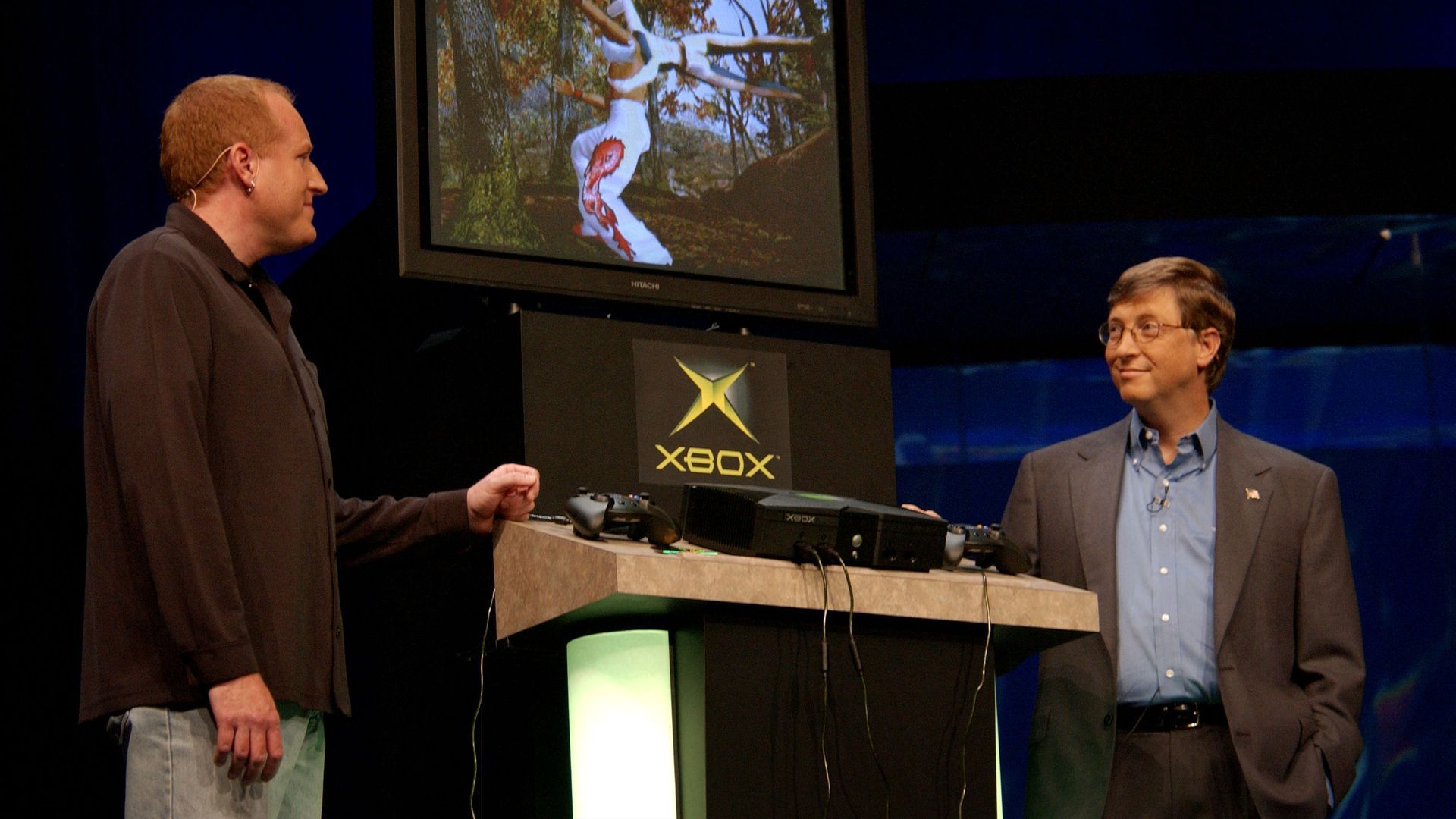Xbox co-creator: "It's past time" to address online harassment
Add Axios as your preferred source to
see more of our stories on Google.

Seamus Blackley (left) and Bill Gates. Photo: David McNew via Getty Images
Xbox co-creator Seamus Blackley is calling on Microsoft and the video game community to address ongoing harassment in online spaces, noting that efforts "will take teamwork between players, devs and console manufacturers to change this and it’s time. It's past time."
Driving the news: On Dec. 19, Twitch streamer Grenade Queen posted a clip of two male players harassing her during a Halo Infinite match.
- One player tells her to go play Fortnite or "whatever you girls do," adding that she's "not meant to be here," while another player tells her to "show your tits on f--king Twitch."
- Blackley shared the video, tweeting that "this wasn’t the future for [Xbox Live] we envisioned. As a community and with the help of Microsoft this needs to be highlighted and stopped."
Blackley joined Microsoft in 1999 and was integral in the creation and design of the original Xbox. He told Axios that his team was working hard to make Xbox Live work at all, on top of promoting the idea that playing online was more fun than playing alone.
- He said that "not enough attention was paid to the problem we all should have known would develop."
- "That level of toxicity really skyrocketed as more of the human race got online, and the spirit of 'we are pioneering this' vanished entirely," he said. "It’s gone from bad to pure evil over the last two decades."
Xbox Live, in particular, has long been a hotbed for player abuse, though Microsoft has made efforts to curb bad behavior.
- Early attempts at Xbox Live moderation included “Gamer Zones” on Xbox 360 profiles, in which players could choose from titles like “Recreation” or “Underground” that would purportedly affect matchmaking.
The big picture: This is not just an Xbox problem; marginalized communities face toxicity on every platform.
- Earlier this year, Twitch streamers held a boycott in protest of the platform's handling of hate raids, a type of targeted abuse usually aimed at marginalized creators.
- Streamers like Emme "Negaoryx" Montgomery have also shared stories of harassment they've endured; Montgomery went viral in January for an impressive takedown of one viewer while flawlessly playing Dead by Daylight.
As Blackley tells Axios, there is no easy answer to solving harassment — but there are steps companies can immediately take.
Why it matters: Combating toxic behavior is a complex issue that requires planning at conception, as well as adaptation as new problems arise and collaboration across different parts of the industry.
- The first, most obvious step, Blackley says, is that platforms like Microsoft or Steam "need to simply pop the bubble and loudly and clearly state that there is a problem and that it needs addressing."
- "I think it’s hard to make that decision in the boardroom because of fear that it somehow alienates the 'core' audience," he tells Axios. "This is of course ludicrous. They are limiting audience size and therefore profit by making huge numbers of potential paying customers avoid their platforms."
In addition to ending anonymous accounts, Blackley says there is a need to put women, people of color and marginalized individuals at the forefront of these efforts.
- "Let’s get [marginalized people] out into positions of power, and let them use that knowledge for good. It just makes practical sense, in addition to sending a powerful message."
Flashback: The company is aware of its ongoing problem; as Xbox head Phil Spencer previously said, "Xbox Live is not a free speech platform."
- "It is not a place where anybody can come and say anything. And as we’re working to ensure it’s a safe and inclusive environment for everybody, I don’t want to be opaque about it. I want to be out there front and center so that you understand our motivation."
The bottom line: "It’s clear that people behave a lot better when their online reputation is tied to their real lives, and it’s also clear that the consequences of enforcement are far more effective if players can’t simply scamper to a new random account," Blackley says.
